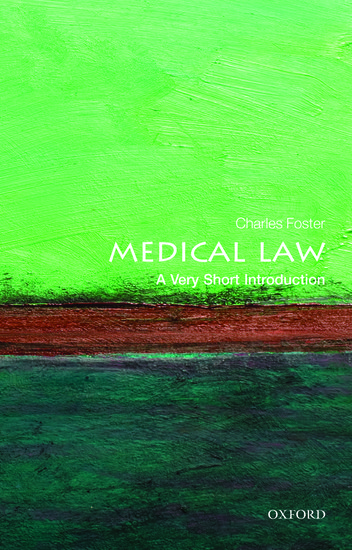Home >
A Very Short Introduction >
Medical Law (Law)
A Very Short Introduction | Law
Medical Law
ISBN: 9780199660445
Series: A Very Short Introduction
Medical Law (Law)
A Very Short Introduction Medical Law (Law) Media > Books > Non-Fiction > Education Books Expect Delays of Up to 4 Weeks| Order Below |
ISBN
9780199660445 (10-digit ISBN: 0199660441)
- Description
- Key Features
- Series Description
- Table of Contents
- An engaging and accessible account of the main principles of medical law
- Examines a wide range of areas from abortion to the availability of IVF, and the withdrawal of medical treatment
- Uses case studies from international jurisdictions to fully understand the main principles
- Assumes no previous knowledge of the subject
Medical law is concerned with our bodies, and what happens to them during and after our lives. When things go wrong with our bodies, we want to know what our rights are, and what governs the conduct of the clinicians into whose hands we put our lives and limbs. Dealing with matters of life and death, it can therefore have a fundamental impact on medical practice. Headlines in the media often involve the core issues of medical law - organ transplantation, abortion, withdrawal of treatment, euthanasia, confidentiality, research on humans - these are topics that affect us all. Headlines can misrepresent, however. In order to fully understand the issues and their relevance, we have to delve into the cases and into the principles behind them. In this highly readable Very Short Introduction, Charles Foster explores different examples to illustrate the key problems and principles of medical law.
Reading Guide
Oxford's Very Short Introductions series offers concise and original introductions to a wide range of subjects--from Islam to Sociology, Politics to Classics, Literary Theory to History, and Archaeology to the Bible.
Not simply a textbook of definitions, each volume in this series provides trenchant and provocative--yet always balanced and complete--discussions of the central issues in a given discipline or field. Every Very Short Introduction gives a readable evolution of the subject in question, demonstrating how the subject has developed and how it has influenced society. Eventually, the series will encompass every major academic discipline, offering all students an accessible and abundant reference library.
Whatever the area of study that one deems important or appealing, whatever the topic that fascinates the general reader, the Very Short Introductions series has a handy and affordable guide that will likely prove indispensable.
Please note: As this series is not ELT material, these titles are not subject to discount.
Acknowledgements
1: Origins and legacies
2: The enforcement of medical law
3: Before birth
4: Confidentiality and privacy
5: Consent
6: Clinical negligence
7: Research on human subjects
8: Resource allocation
9: The end of life
10: Organ donation and the ownership of body parts
11: The future of medical law
References: Cases discussed
Further reading
Medical law is concerned with our bodies, and what happens to them during and after our lives. When things go wrong with our bodies, we want to know what our rights are, and what governs the conduct of the clinicians into whose hands we put our lives and limbs. Dealing with matters of life and death, it can therefore have a fundamental impact on medical practice. Headlines in the media often involve the core issues of medical law - organ transplantation, abortion, withdrawal of treatment, euthanasia, confidentiality, research on humans - these are topics that affect us all. Headlines can misrepresent, however. In order to fully understand the issues and their relevance, we have to delve into the cases and into the principles behind them. In this highly readable Very Short Introduction, Charles Foster explores different examples to illustrate the key problems and principles of medical law.
Reading Guide
Key Features
- An engaging and accessible account of the main principles of medical law
- Examines a wide range of areas from abortion to the availability of IVF, and the withdrawal of medical treatment
- Uses case studies from international jurisdictions to fully understand the main principles
- Assumes no previous knowledge of the subject
Series Description
Oxford's Very Short Introductions series offers concise and original introductions to a wide range of subjects--from Islam to Sociology, Politics to Classics, Literary Theory to History, and Archaeology to the Bible.
Not simply a textbook of definitions, each volume in this series provides trenchant and provocative--yet always balanced and complete--discussions of the central issues in a given discipline or field. Every Very Short Introduction gives a readable evolution of the subject in question, demonstrating how the subject has developed and how it has influenced society. Eventually, the series will encompass every major academic discipline, offering all students an accessible and abundant reference library.
Whatever the area of study that one deems important or appealing, whatever the topic that fascinates the general reader, the Very Short Introductions series has a handy and affordable guide that will likely prove indispensable.
Please note: As this series is not ELT material, these titles are not subject to discount.
EASY ORDER FORM
PRICES LISTED INCLUDE CONSUMPTION TAX
Price Before Tax:
¥1,790


